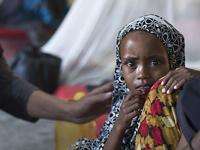Mobilizing Financial and Technical Resources Must be a Political Priority in Fight Against Resurgent Outbreaks
As the Measles Initiative meets in Washington, D.C., MSF is calling for an effective outbreak response mechanism to be established immediately to deal with the rising numbers of severe outbreaks worldwide.
Paris/New York, September 12, 2011 – On September 13-14, 2011, the Measles Initiative will meet in Washington, D.C., bringing together organizations seeking to eliminate measles worldwide. Given the troubling resurgence of measles epidemics over the last three years, Doctors Without Borders/Médecins Sans Frontières (MSF) is calling for an effective outbreak response mechanism to be established immediately, with secure financial and technical resources.
"We know for a fact that there will be additional epidemics in the near future," said Florence Fermon, MSF's vaccination coordinator. "It would simply not be right to wait for them to occur. We need an effective system to anticipate and prepare for the coming outbreaks."
For more information, see MSF’s latest measles backgrounder.
Since 2008, MSF has responded to epidemics that have expanded over time. In 2010, for example, more than 4.5 million children were vaccinated in emergencies in many countries, including Chad, Malawi, South Africa, Yemen and Zimbabwe. This year, medical teams in the Democratic Republic of Congo (DRC) vaccinated three million children, but could not halt the epidemic. Despite data showing the urgent need for action, actors in the field were slow to organize. The DRC is no exception. Most countries that experience these epidemics do not adequately mobilize the resources available to them and organize vaccination campaigns.
"The fight against measles is no longer seen as a political priority – not within ministries of health, which must make trade-offs for public health, and not by donors, who are reducing funding," said Gwenola François, measles vaccination campaign manager in the DRC. "However, non-governmental organizations like MSF cannot just rush in to put out the fires caused by the structural deficiencies of measles prevention programs."
Recurring measles epidemics point to the weaknesses of vaccination programs and demonstrate the failure of global strategies to eliminate the disease. There are many flaws in prevention activities (systematic vaccination and follow-up campaigns), including over-estimating the rate of vaccination coverage, the rigidity of limiting vaccination before the age of one, delays in and cancellations of certain follow-up campaigns, and the failure to identify areas at risk of outbreaks.
In addition, weak monitoring systems cannot detect outbreaks quickly. Official declarations of epidemics come too late and adequate responses are not implemented fast enough. Ultimately, an increasingly large group of children at risk of measles has formed over the years and has become large enough to trigger an epidemic.
With additional epidemics imminent, vaccination policies should be revised completely -- both in terms of epidemic response and preventive vaccination programs to achieve optimal protection against future outbreaks in high-risk areas. To prepare for the coming epidemics, these efforts require technical and financial resources that can be mobilized quickly. Measles treatment must also be incorporated systematically into overall public health strategies.
The World Health Organization (WHO) now recognizes the impact of vaccination on measles mortality in the context of epidemics. This follows several studies on vaccinations during measles outbreaks in four MSF emergency responses, published in 2008 by MSF’s research branch, Epicentre.
For more information on these studies, please view the research article.
Doctors Without Borders/Médecins Sans Frontières (MSF) is an international independent medical humanitarian organization that delivers emergency aid to people affected by armed conflict, epidemics, natural and man-made disasters, and exclusion from health care in more than 60 countries and was the recipient of the 1999 Nobel Peace Prize.




